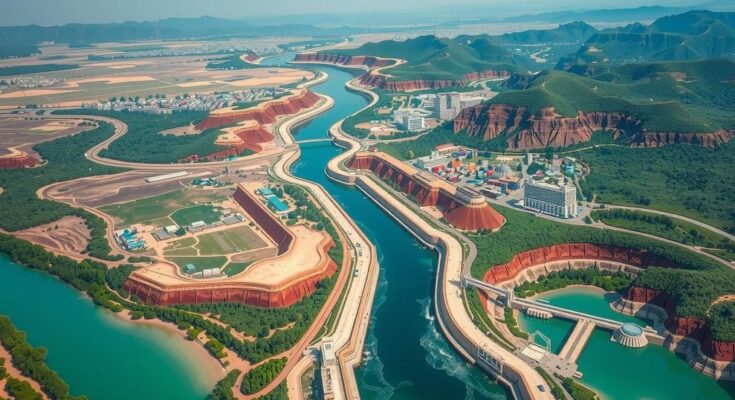Morocco’s “water highway” redirects water from northern rivers, costing $728 million, to alleviate water shortages in Rabat and Casablanca. As drought persists, concerns regarding the project’s sustainability amid climate change arise. Experts emphasize the importance of water-efficient practices and additional investments in desalination to secure future water resources.
Morocco is investing significantly in developing a so-called “water highway,” a project aimed at transporting surplus water from northern rivers to meet the demand in major southern cities, particularly Rabat and Casablanca. The initiative has involved an expenditure of approximately $728 million to address immediate water shortages in these highly populated urban areas.
Officials have touted the project’s success in averting a potential water crisis for over 12 million residents. Mahjoub Lahrache, a senior official in the agriculture ministry, indicated that the transfer of surplus water from the Sebou River basin has played a critical role in preventing severe shortages. The project scaled urgency as Rabat faced significant risks of running out of water late in 2023 when its main reservoir nearly depleted.
Morocco’s geographic disparities contribute to water challenges, with 53% of national rainfall occurring in only 7% of its territory. The historically abundant rainfall in the Atlas mountain ranges has enabled surplus flow for northern rivers even during drier seasons, which the water highway now capitalizes on. A strategically constructed diversion dam in Kenitra has been fundamental to this project by redirecting the Sebou River’s flow.
Since its inauguration in August, the water highway has supplied over 700 million cubic meters of drinking water to Rabat and Casablanca by early March. Nevertheless, concerns have been raised regarding the sustainability of relying on the Sebou and other rivers to provide continuous surpluses due to changing climate conditions
After enduring six years of drought, Morocco is grappling with significant water supply shortages, with annual availability decreasing drastically from an average of 18 billion cubic meters in the 1980s to a current five billion. Despite some rainfall in early March, the country is still facing a severe drought, noted as the longest in its recorded history, with rainfall levels 75% below historical averages.
Compounding the issue, rising temperatures are exacerbating evaporation rates, further decreasing available water resources. Nabil El Mocayd, a water and climate researcher, warns that climate change is likely to increasingly impact northern water basins, potentially nullifying the concept of water surpluses in the future. He underscores the understanding that what is currently surplus may transmute into scarcity as conditions worsen.
The demand for water is also heightened by Morocco’s agricultural sector, which employs a significant portion of the workforce. Researcher Abderrahim Handouf stresses the importance of implementing water-efficient irrigation technologies to support farmers. While Handouf acknowledges the “water highway” as a necessary interim measure, he urges investment in seawater desalination facilities to sustainably address future water requirements for Morocco’s urban centers.
In conclusion, while Morocco’s water highway aims to alleviate immediate water shortages by transporting surplus water to southern cities, the long-term sustainability of this initiative is under scrutiny due to the impacts of climate change. Rising temperatures, prolonged droughts, and an increasing demand for agricultural water highlight the need for adaptive strategies. Experts advocate for further innovations in irrigation and investments in alternative water sources, such as desalination, to ensure resource availability in the future.
Original Source: www.swiowanewssource.com




